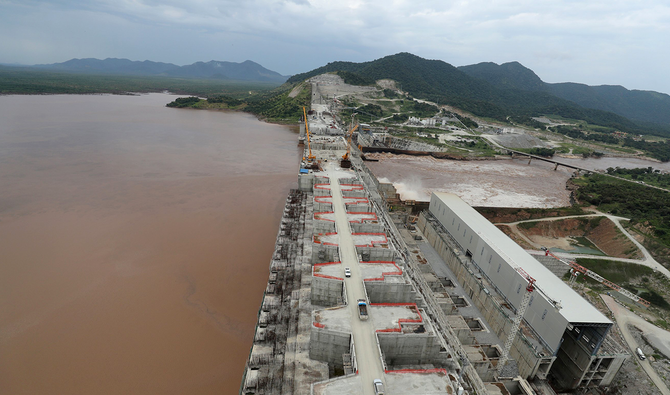CAIRO: Ethiopia has opened the floodgates to further controversy over a giant dam scheme by rejecting Egypt’s historic claims to the waters of the Nile.
Ahead of the anticipated resumption of stalled talks over the Grand Ethiopian Renaissance Dam (GERD) project, two Ethiopian ministers poured water over the Egyptian stance on river rights.
In a speech to political party representatives and religious leaders regarding the latest developments in GERD negotiations, Ethiopian Minister of Water, Irrigation and Energy Seleshi Bekele said the talks, also involving Sudan, were being “clouded by Egypt’s tendency to recall and confirm the so-called (historic rights) in water, which can never be accepted by Ethiopia or Nile-sharing countries.”
Ethiopian Minister of Foreign Affairs Gedu Andargachew added that his country’s position was firm with regard to utilizing its water resources in a fair way “in accordance with the agreed cooperation principles and not causing any major damage.”
Meanwhile, Ethiopian religious leaders have called on the government to press ahead with the construction of the dam while negotiating with Nile-sharing countries.
Ethiopia’s official news agency ENA, reported that a statement issued during a press conference by the Ethiopian inter-religious council of seven institutions, “underlined Ethiopia’s natural right in developing the Nile.” The council also called for the resumption of tripartite discussions.
Ethiopian Orthodox Tewahedo Church Patriarch Abune Mathias said the government needed to continue with construction of the dam on the basis of mutual understanding with upstream countries and without any foreign intervention.
Mathias pointed out that the Ethiopian people had played a big part in funding the project in the hope of improving their living conditions and seeing the development for their country, adding that work should carry on “for the sake of the people” without causing any damage to Nile-sharing countries.
Cardinal Berhaneyesus Demerew Souraphiel, head of the Ethiopian Catholic Church, said that Ethiopia had “the right to develop its rivers in order to provide electricity for millions of its citizens, just like Egypt did. Egyptians are provided with electricity better than the Ethiopians. In our situation, students and families do not have electricity.
“Upstream countries must know that the Ethiopian people do not have the intention to harm Egypt or Sudan,” he added.
Ethiopian Islamic Affairs Supreme Council Secretary-General Sheikh Qassem Mohammed Tag El-Din also agreed that Ethiopia should carry on with building the dam “in the best interest of its people who are living in darkness and who do not have electricity.
“Concerning the dam, we need to stand together in harmony and even make sacrifices if this is what it takes to complete the project,” he added.
The tripartite negotiations, which have been stalled for several months, are close to resuming.
The Sudanese Ministry of Irrigation announced that two separate meetings were recently held between Sudanese Minister of Irrigation and Water Resources Yasser Abbas and his counterparts from Egypt and Ethiopia, Mohammed Abdel-Ati and Bekele, respectively.
The ministry added that two members of the delegation from each country attended the meetings which had been set up to pave the way for fresh GERD negotiations.
In a statement, Sudan’s irrigation ministry said that the ministerial meetings had followed recent talks held between Sudanese Prime Minister Abdullah Hamdok and his Egyptian and Ethiopian counterparts.
Abbas Sheraqy, professor of water resources at Cairo University’s faculty of African studies, said Ethiopia’s attempts to return to the negotiation table to settle the GERD issue had swung between resumption and manipulation.
He pointed out that Ethiopia was ready to resume GERD discussions despite having failed to attend the final day of the last round of negotiations in Washington in February last year, when it was due to sign an agreement, drafted by the US in collaboration with the World Bank, on the filling and operation of the dam.
Ethiopia’s U-turn did “not befit a sovereign state that is a UN member under the pretext that it needed more consultations, as if nine years of negotiations were not enough,” he added.
Sheraqy underlined the need to resume the talks in Washington and not to allow Ethiopia to cancel them which, he said, was its precondition to resuming them. He added that Ethiopia recently called for allowing downstream countries to attend the negotiations under the umbrella of the African Union.
Addis Ababa, he noted, was aiming to waste time and further complicate the GERD issue and was pushing Egypt into a new issue with downstream countries.
Egypt has stressed during its negotiations with Ethiopia the need to maintain its historic rights to the Nile waters. A 1929 treaty (and a subsequent one in 1959) gave Egypt and Sudan rights to nearly all of the Nile waters. The document also gives Egypt veto powers over any projects by upstream countries that would affect its share of the waters.
Ethiopia launched construction in 2011 on the Blue Nile in the northern Ethiopian highlands, from where 85 percent of the Nile’s waters flow.
One of Egypt’s main worries is that if the water flow diminishes, it could affect Lake Nasser, the reservoir further downriver, behind Egypt’s Aswan Dam.
Ethiopia said that 73 percent of the GERD project had been completed. Its government is to start deliberations within a month on a date to start filling the dam.

























